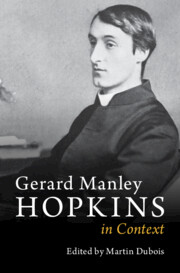Book contents
- Gerard Manley Hopkins in Context
- Gerard Manley Hopkins in Context
- Copyright page
- Contents
- Illustrations
- Notes on Contributors
- Note on Editions and Abbreviations
- Chronology
- Introduction
- Part I Places
- Part II Aesthetic and Cultural Contexts
- Chapter 6 Visual Culture
- Chapter 7 Classics
- Chapter 8 Anglo-Saxonism
- Chapter 9 Music
- Part III Religious, Theological, and Philosophical Contexts
- Part IV Nature, Science, and the Environment
- Part V Gender, Sexuality, and the Body
- Part VI Form, Genre, and Poetics
- Part VII Reception and Influence
- Further Reading
- Index
Chapter 7 - Classics
from Part II - Aesthetic and Cultural Contexts
Published online by Cambridge University Press: 16 January 2025
- Gerard Manley Hopkins in Context
- Gerard Manley Hopkins in Context
- Copyright page
- Contents
- Illustrations
- Notes on Contributors
- Note on Editions and Abbreviations
- Chronology
- Introduction
- Part I Places
- Part II Aesthetic and Cultural Contexts
- Chapter 6 Visual Culture
- Chapter 7 Classics
- Chapter 8 Anglo-Saxonism
- Chapter 9 Music
- Part III Religious, Theological, and Philosophical Contexts
- Part IV Nature, Science, and the Environment
- Part V Gender, Sexuality, and the Body
- Part VI Form, Genre, and Poetics
- Part VII Reception and Influence
- Further Reading
- Index
Summary
All his life, Hopkins was either student or teacher of the Classics. School, university, teaching posts, and finally a professorship in Dublin meant that he was engaged professionally with Latin and Greek almost without intermission. There are subjects, topics, or words in his writings which obviously derive directly from those studies, and there are approaches which were plainly learned from his experience. Specific examples of influence are betrayed by words and ideas, but the influence is perhaps more general; in word order, for example, or in the idea of poetry as speech, which connects with his discovery and use of Sprung Rhythm. His understanding of rhythm is the most important thing which his classical studies nurtured. In his university training and in his own teaching rhythm was a central concern. The Classics gave him models to follow, but they also freed him from some conventions of English poetry, which allowed him to write in an original style.
- Type
- Chapter
- Information
- Gerard Manley Hopkins in Context , pp. 60 - 68Publisher: Cambridge University PressPrint publication year: 2025

